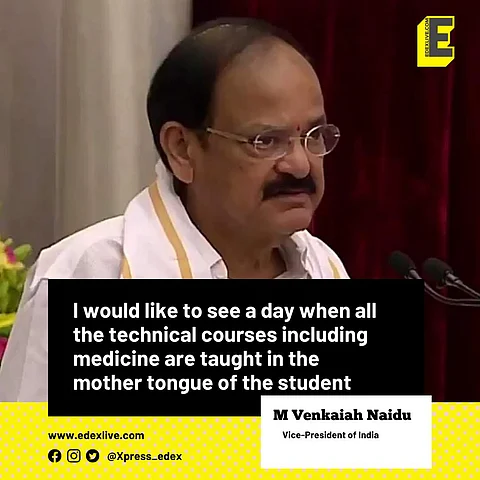

Addressing the sixth convocation of PES University, Bengaluru, Vice-President M Venkaiah Naidu, stated that since the fourth industrial revolution is almost upon us, the higher education institutions needed to equip the youth with 21st-century skills.
The VP called for the implementation of the National Education Policy (NEP) 2020 both in letter and spirit and added that, "The new education policy is a well documented, well researched and well thought of policy document, which has been presented to the country after a long, detailed discussion with all the stakeholders and every university and educational institution, state and central government institutions, should seriously and truthfully implement the policy in letter and spirit."
Venkaiah Naidu also pointed out that there is a need to align the classrooms of varsities to emerging global trends like 5G which find application in areas like agriculture, medicine and so on. He also appreciated the students and staff members of the university who, in association with DRDO and ISRO, built and launched two satellites. He pointed out that the government has already come out with reforms in the space field which is aimed at encouraging private sector participation in the field. He also mentioned drone technologies and said that the drone services industry is capable of generating more than five lakh jobs in the next three years and with its innovation, IT and frugal engineering, India can become the global drone hub.
"We must focus our attention on creating skilled manpower for this sector. In fact, all our higher education institutions and universities should be alive to national needs and they must review and align their existing courses to the emerging global trends or start new courses in tune with them," he said.
Since the global economy is dependent on knowledge-related activities in the 21st century, the VP said that India aims to become a multi-trillion dollar economy by 2050 and NEP 2020 sets a target of at least 50 per cent of this to come from knowledge-related activities and skills. He also stated that a special role needs to be essayed by technological universities for India's transformation into a knowledge power to take place.
He also urged universities to lay more emphasis on implementable patents under Intellectual Property rights (IPR) rather than academic patents to give a fillip to economy and industry and said that the country needed to adopt a multidisciplinary approach to R&D and strengthen industry-institute linkages for better research outcomes.
The VP went on to state that several engineering books that are a go-to for engineering students are authored by foreign authors and if our academicians could author books of global standards to strengthen our own knowledge economy, it would be great. "I say so because Indian authors can better contextualise the engineering course content with regard to Indian socio-economic conditions," he said.
Study material in Indian languages would be of great benefit for the students of the country and will help in promoting the languages too, he said and added, "I would like to see a day when all the technical courses including medicine are taught in the mother tongue of the student."
He also asked the indigenous publication of academic journals to maintain their hold over copyright and ownership of knowledge generated in India otherwise it might be, "transferred to the international journals in which our research papers get published," he said. He also stated that universities need to address nationally relevant and globally sensitive issues. "In recent times, two such issues are demanding global attention — climate change and sustainable development. Technological universities and national institutes have an obligation to participate in these globally prioritised issues," he added.
